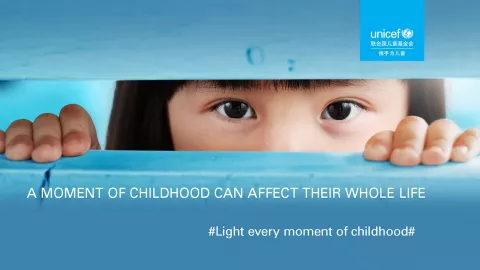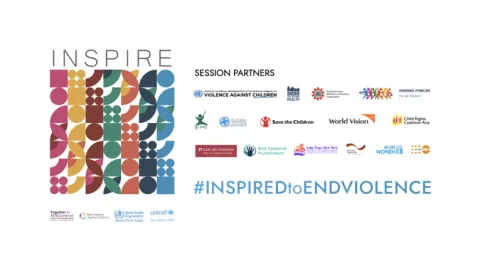New global data expose acute prevalence of violence against children - UNICEF
- Available in:
- 中文
- English
NEW YORK, 4 September 2014 – UNICEF today released the largest-ever compilation of data on violence against children shows the staggering extent of physical, sexual and emotional abuse -- and reveals the attitudes that perpetuate and justify violence, keeping it "hidden in plain sight" in every country and community in the world.
"These are uncomfortable facts — no government or parent will want to see them," said UNICEF Executive Director Anthony Lake. "But unless we confront the reality each infuriating statistic represents — the life of a child whose right to a safe, protected childhood has been violated — we will never change the mind-set that violence against children is normal and permissible. It is neither."
The UNICEF report "Hidden in Plain Sight" draws on data from 190 countries, documenting violence in places where children should be safe: their communities, schools and homes. It details the lasting, often inter-generational effects of violence, finding that exposed children are more likely to become unemployed, live in poverty and be violent towards others. The authors note that the data is derived only from individuals who were able and willing to respond, and therefore represent minimum estimates.
At the same time, UNICEF East Asia and Pacific is launching a related report "Violence against Children in East Asia and the Pacific," which delves more deeply into existing studies on the prevalence and consequences of violence against children in the region.
Commenting on the regional report's findings, UNICEF Regional Adviser for Child Protection Stephen Blight said: "There are three key ways to eliminate violence against children. First, you need smart, strong laws and the will and resources to enforce them. Second, to help families cope, you need robust social welfare systems that parents build a nurturing environment for their children. Third, we need to change harmful norms and assumptions so that all our communities become places where no act that endangers a child is considered acceptable."
Major findings of the UNICEF report "Hidden in Plain Sight" include:
- Sexual violence: Around 120 million girls under the age of 20 worldwide (about 1 in 10) have experienced forced intercourse or other forced sexual acts, and 1 in 3 ever-married adolescent girls aged 15 to 19 (84 million) have been victims of emotional, physical or sexual violence committed by their husbands or partners. In the Philippines, where for 40 percent of adolescent girls who experienced forced sexual intercourse or sexual acts, the perpetrator was a current/former boyfriend, and for 25 percent it was their current husband/partner.
- Homicide: One fifth of homicide victims globally are children and adolescents under the age of 20, resulting in about 95,000 deaths in 2012. Of these, 7,100 were in East Asia and the Pacific, with the highest rate in the region in Myanmar, followed by Cambodia.
- Bullying: Slightly more than 1 in 3 students between the ages of 13 and 15 worldwide are regularly bullied in school; in Samoa, the proportion is almost 3 in 4. Over 20 per cent of students aged 13-15 surveyed in Myanmar, over 30 per cent in Thailand, and nearly 40 in Indonesia reported being physically attacked by other students in the past 12 months.
- Violent discipline: About 17 per cent of children in 58 countries are subject to severe forms of physical punishment (hitting on the head, ears or face or hitting hard and repeatedly). In Fiji, Kiribati, Lao PDR, Vanuatu, Viet Nam, and Solomon Islands, over 70 percent of children aged 2-14 reported experiencing violent punishment in the previous month. In Mongolia, the figure was over 40 per cent.
- Attitudes towards violence: Close to half of all adolescent girls aged 15 to 19 (around 126 million) believe a husband is justified in hitting his wife under certain circumstances. The proportion rises to 80 per cent in Timor-Leste. In 28 of 60 countries with data on both sexes, a larger proportion of girls than boys believe that wife-beating is sometimes justified. In two countries in East Asia and the Pacific, Cambodia and Mongolia, girls are around twice as likely as boys to think a husband is sometimes justified in hitting his wife. Data from 30 countries suggest that about seven in 10 girls 15-19 years old who had been victims of physical and/or sexual abuse had never sought help: many said they did not think it was abuse or did not see it as a problem.
UNICEF points to six strategies to enable society as a whole, from families to governments, to prevent and reduce violence against children. They include supporting parents and equipping children with life skills; changing attitudes; strengthening judicial, criminal and social systems and services; and generating evidence and awareness about violence and its human and socio-economic costs, in order to change attitudes and norms.
In East Asia and the Pacific, the Government of Indonesia has in past few years developed a comprehensive legal framework to protect children and committed resources to enforce this. Child protection remains a priority in Indonesia's National Strategic Plan 2015-2019, due to be launched later this year.
"Violence against children occurs every day, everywhere. And while it harms individual children the most, it also tears at the fabric of society — undermining stability and progress. But violence against children is not inevitable. It is preventable — if we refuse to let violence remain in the shadows," Lake said. "The evidence in this report compels us to act — for the sake of those individual children and the future strength of societies around the world."
About the #ENDViolence initiative:
UNICEF launched the initiative on 31 July 2013 to urge collective action to end violence against children, highlighting the fact that violence is everywhere, but often happens out of sight or is tolerated due to social and cultural norms. Under the banner 'Make the invisible, visible', the initiative aims to raise awareness as a first step toward modifying attitudes, behaviours and policies. The initiative also supports efforts to build evidence of what works, and reinforces the idea that violence can be prevented by highlighting successful efforts and movements at all levels of society. Some 70 countries from every region of the world have formally joined #ENDviolence, strengthening efforts to identify, track and report violence against children in all its forms.
For more information visit: http://www.unicef.org/endviolence/
Media contacts
About UNICEF
UNICEF works in some of the world's toughest places, to reach the world's most disadvantaged children. Across 190 countries and territories, we work for every child, everywhere, to build a better world for everyone. For more information about UNICEF and its work for children visit www.unicef.org.
| Visit UNICEF China website: www.unicef.cn Follow us on Sina Weibo: http://weibo.com/unicefchina Tencent Weibo: http://t.qq.com/unicef Wechat: unicefchina |



